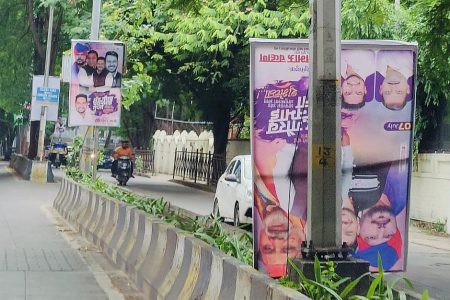Bombay HC directs Maharashtra govt to submit action plan against illegal hoardings | Representational Image
Mumbai: The Bombay High Court on Tuesday directed the State Advocate General Birendra Saraf to submit a detailed action plan to ensure stricter enforcement against illegal hoardings across Maharashtra. The court emphasised that despite multiple orders over the years, the problem persists due to lack of “effective implementation”.
A bench of Chief Justice Alok Aradhe and Justice MS Karnik asked Saraf to collate suggestions from all the parties concerned, along with his additions, so that it “can deal with menace of illegal hoardings”.
The HC, which has been monitoring the issues for over 13 years, was hearing a PIL by NGO Suswarajya Foundation and others raising the grievance against illegal hoardings, banners and posters. The court observed that while a detailed order was passed in 2016 by a bench led by Justice Abhay Oka (now a Supreme Court judge), it was not being implemented.
Advocate Uday Warunjikar, representing the petitioner, argued that while all municipal corporations had been made parties in the case, the implementation of HC orders remained weak.
He said that the “system was in place” to tackle the menace of illegal hoardings, however, the same was not being implemented. Although there is a website and number to complaint against illegal hoardings, there is not much public awareness about the same. He suggested that strict regulations for printers, ensuring flex and banners are not printed without authorisation.
Justice Karnik acknowledged that despite numerous court orders post Justice Oka’s ruling, political party hoardings continued to be a major issue. The HC had previously directed that political parties should identify responsible persons who could be held accountable under the Defacement Act.
Earlier, pursuant to HC notices, political parties had given an undertaking that it would instruct its workers to refrain from putting up hoardings and banners without permission.
Senior Advocate Narendra Walawalkar, appearing for the BMC, suggested that local political leaders be identified in every ward and held accountable under the Defacement Act. He said that there was a need for uniformity in police action across different jurisdictions to ensure consistent enforcement. Moreover, harsher penalties were required to deter violators, as the current quantum of punishment is too low.
The bench was informed that Latur municipal corporation has achieved the feat of having zero illegal hoardings, whereas Ambernath Municipal Council is nearly 90% free of such hoardings.
Justice Karnik questioned how Latur and Ambernath successfully became nearly 100% hoarding-free, while Mumbai and other cities continued to struggle with illegal banners. The court sought a common regulatory framework for monitoring printers and enforcement agencies.
The BMC informed the court that they had introduced a QR code system on authorised hoardings, allowing easy identification of illegal banners. Ward officers are instructed to remove hoardings without QR codes daily.
However, the AG pointed out that enforcement slackens during elections and festival seasons, leading to a resurgence of illegal banners. The court also noted that corporations require additional police force for enforcement, to which the AG responded that the state government provides police support whenever required.
The court directed all parties to compile suggestions and submit them to the AG, who must submit a written action plan. The HC has scheduled the next hearing on May 2.

